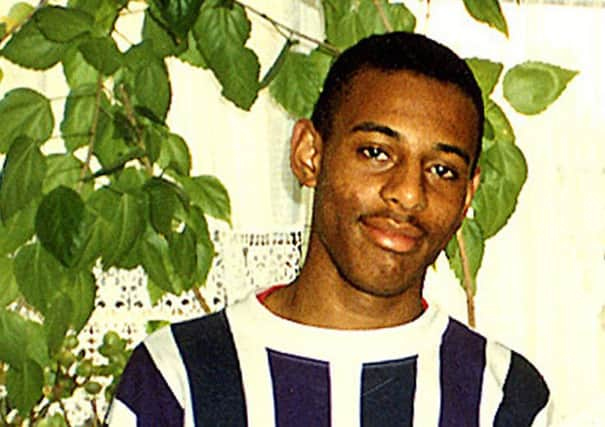Why Scots children should learn about Stephen Lawrence’s murder – Martyn McLaughlin


It is difficult to believe that some 26 years have passed since the brutal murder of Stephen Lawrence. The latest anniversary, like all before it, is a time of reflection. But so too, it is a time to guard against forgetfulness and ensure the lessons of a heinous loss are carried on to new generations.
All of us should therefore give thanks to Baroness Lawrence, whose tireless pursuit of hope and equality has been inspirational.
Advertisement
Hide AdAdvertisement
Hide AdNow, to mark the inaugural Stephen Lawrence Day, she has shown a renewed determination to ensure such qualities are not forgotten. Central to this goal is Baroness Lawrence’s desire to see schools across the country seize momentum and directly challenge racism and discrimination through classroom learning.
As she explained: “If we are to encourage future generations to build a better society, free from discrimination, I believe that we must teach tolerance and inclusion from an early age.”
The senseless loss of Stephen’s young life has, of course, sparked widespread change already. Some two decades have now passed since the publication of the Macpherson report, a publication that sent shockwaves through British society as it singled out professional incompetence, institutional racism, and a damning failure of leadership as the defining characteristics of the investigation into Mr Lawrence’s killing.
The ramifications of the report were felt not only in the Metropolitan Police Service, but across other police forces and the entire criminal justice system. Faced with a rotten culture, operations, and practices, there was a hard-won overhaul of the police disciplinary and complaints system, as well as sweeping legislative changes such as the Race Relations (Amendment) Act 2000, which extended protection to victims of discrimination not just by the police, but the entire public sector.
The impact of these changes not only compelled public bodies to promote good race relations and equality of opportunity, it prompted British society to examine itself anew. All these years later, it is time to reassert this principle of self-scrutiny. Stephen Lawrence Day, which seeks to build and promote a cohesive, safe and inclusive society, could not have arrived at a better time.
At the turn of the millennium, as the Macpherson report’s recommendations were being put in place, there were 21,750 recorded racially aggravated offences in England and Wales. Last year, the figure stood at 55,557.
But for those who suggest this is a particularly English problem, or even one that is isolated to the Met’s force area, there should sound a warning against complacency.
In Scotland, some 3,249 race crime charges were reported over the past year. That may represent a four per cent year on year decrease, and the lowest annual figure since consistent data became available some 15 years ago, but those who regard such a trend as evidence of progress would be best advised to reserve judgement.
Advertisement
Hide AdAdvertisement
Hide AdLast year, 284 charges were reported with an aggravation of prejudice relating to disability. That is 51 per cent more than in 2016/17, and the highest number of charges reported since the legislation came into force in 2010.
Similarly, 1,112 charges were reported last year with an aggravation of prejudice relating to sexual orientation. The latest in a series of consistent annual spikes. That has undoubtedly gone hand in hand with increased public awareness, but it is a danger to simply presume that the next generation requires no assistance in learning what is right and wrong.
In Scotland, the curriculum for excellence emphasises encouraging children and young people to identify and practice skills that allow them to form positive relationships with others, with educators using benchmarks such as tolerance, empathy, loyalty, kindness, mutual trust, and respect in order to gauge their progress.
All of these traits are desirable, and developed together, will help pupils become caring, resilient citizens. Is mere encouragement sufficient, however? The importance the inspirational Baroness Lawrence places on a dedicated focus in our schools on teaching tolerance and inclusion should be implicit, but there is no harm in spelling it out. Indeed, there is potential harm in not doing so.
The particular values she cites cannot and should not be taken for granted. The only way to ensure they thrive is by embedding them in the classroom.
Only last August, the Educational Institute of Scotland emphasised the “urgent need” for concerted efforts to ensure that anti-racist education pervades Scottish educational establishments.
The nation’s largest teaching union praised curricular efforts which used the likes of Robert Burns’s The Slave’s Lament, the Diary of Anne Frank, and figures such as Rosa Parks and JFK in order to explore issues such as slavery, anti-semitism, and civil rights.
The modern examples – such as the use of Theresa Breslin’s Divided City to look at sectarianism and racism – are conspicuous by their rarity. The death of Stephen Lawrence, and the changes and continuing challenges it spurred, is surely one which our children can benefit from understanding. It is one of the most painful and shaming chapters in the history of modern Britain. For that reason alone, its place in the curriculum is warranted.